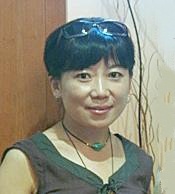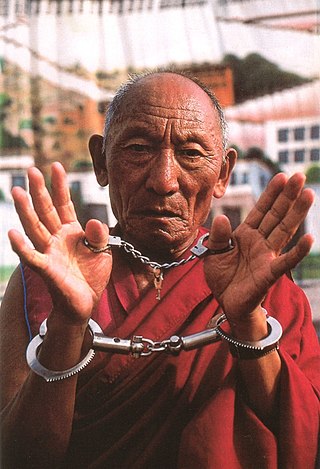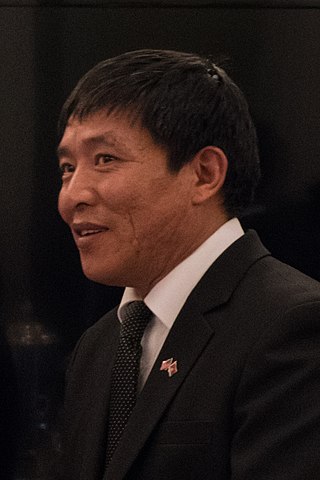Human rights in China are periodically reviewed by the United Nations Human Rights Committee (UNHRC), on which the Chinese Communist Party (CCP), government of the People's Republic of China (PRC) and various foreign governments and human rights organizations have often disagreed. CCP and PRC authorities, their supporters, and other proponents claim that existing policies and enforcement measures are sufficient to guard against human rights abuses. However, other countries and their authorities, international non-governmental organizations (NGOs) including Human Rights in China and Amnesty International, and citizens, lawyers, and dissidents inside the country, state that the authorities in mainland China regularly sanction or organize such abuses.
Free Tibet (FT) is a non-profit, non-governmental organisation, founded in 1987 and based in London, England. According to their mission statement, Free Tibet advocates for "a free Tibet in which Tibetans are able to determine their own future and the human rights of all are respected."
Tibetan Freedom Concert is the name given to a series of socio-political music festivals held in North America, Europe and Asia from 1996 onwards to support the cause of Tibetan independence. The concerts were originally organized by the Beastie Boys and the Milarepa Fund. The idea for a Live Aid-style concert for Tibet was conceived by members of the group during the 1994 Lollapalooza Tour.

Students For a Free Tibet (SFT) is a global grassroots network of students and activists working in solidarity with the Tibetan people for human rights and freedom. The group uses education, advocacy, and nonviolent direct action with the goal of achieving Tibetan independence. SFT advocates self-determination for Tibet because of Tibet's historical status as well as opposing the Chinese government's violation of the Tibetan people's human rights, cultural heritage, environment, language and religion.

Hu Jia is a Chinese civil rights activist and noted critic of Chinese Communist Party. His work has focused on the Chinese democracy movement, Chinese environmentalist movement, and HIV/AIDS in the People's Republic of China. Hu is the director of June Fourth Heritage & Culture Association, and he has been involved with AIDS advocacy as the executive director of the Beijing Aizhixing Institute of Health Education and as one of the founders of the non-governmental organization Loving Source. He has also been involved in work to protect the endangered Tibetan antelope. For his activism, Hu has received awards from several European bodies, such as the Paris City Council and the European Parliament, which awarded the Sakharov Prize for Freedom of Thought to him in December 2008.

Tsering Woeser is a Tibetan writer, activist, blogger, poet and essayist.

Palden Gyatso was a Tibetan Buddhist monk. Arrested for protesting during the Chinese invasion of Tibet, he spent 33 years in Chinese prisons and labor camps, where he was extensively tortured, and served the longest term of any Tibetan political prisoner. After his release in 1992 he fled to Dharamsala in North India, in exile. He was still a practicing monk and became a political activist, traveling the world publicizing the cause of Tibet up until his death in 2018. His autobiography Fire Under the Snow is also known as The Autobiography of a Tibetan Monk. He was the subject of the 2008 documentary film Fire Under the Snow.

The 2008 Tibetan unrest, also referred to as the 2008 Tibetan uprising in Tibetan media, was a series of protests and demonstrations over the Chinese government's treatment and persecution of Tibetans. Protests in Lhasa, the capital of Tibet, by monks and nuns on 10 March have been viewed as the start of the demonstrations. Numerous peaceful protests and demonstrations were held to commemorate the 49th anniversary of the 1959 Tibetan Uprising Day, when the 14th Dalai Lama escaped from Tibet. The protests and demonstrations spread spontaneously to a number of monasteries and throughout the Tibetan plateau, including into counties located outside the designated Tibet Autonomous Region. The arrest of monks at Labrang Monastery increased the tension of the situation. Violence began when Chinese police and People's Liberation Army units used force on non-violent protests by monks and nuns, and spread when protesting Tibetans later clashed with security forces. Clashes also occurred between Tibetans and Chinese Han and Hui residents, resulting in Han and Hui stores and buildings being destroyed and numerous Chinese civilians being injured or killed.
The 2008 Tibetan unrest was a series of protests and demonstrations met by excessive force, focused on the persecution of Tibetans, in the buildup to the 2008 Summer Olympics in Beijing. There was a mixture of outrage and understanding from leading figures abroad.
Tibetan Canadians are Canadian citizens of Tibetan ancestry. Although Tibetan Canadians comprise a small portion of Asian Canadians, Canada holds one of the largest concentrations of Tibetans outside of Asia. Tibetans began immigrating to Canada as early as the early 1970s.
Human rights in Tibet is a contentious issue. Reported abuses of human rights in Tibet include restricted freedom of religion, belief, and association; arbitrary arrest; maltreatment in custody, including torture; and forced abortion and sterilization. The status of religion, mainly as it relates to figures who are both religious and political, such as the exile of the 14th Dalai Lama, is a regular object of criticism. Additionally, freedom of the press in China is absent, with Tibet's media tightly controlled by the Chinese leadership, making it difficult to accurately determine the scope of human rights abuses.

The 2010 Tibetan language protest was a series of protests in Tongren County, Gonghe County and Maqên County, in Qinghai Province; Minzu University of China in Beijing; and Xiahe County in Gansu Province, People's Republic of China by ethnic Tibetan students over the period of October 20 through October 27, 2010.

Tethong Tenzin Namgyal is a Tibetan politician and a former Prime Minister of Central Tibetan Administration.

Dhondup Wangchen is a Tibetan filmmaker imprisoned by the Chinese government in 2008 on charges related to his documentary Leaving Fear Behind. Made with senior Tibetan monk Jigme Gyatso, the documentary consists of interviews with ordinary Tibetan people discussing the 14th Dalai Lama, the Chinese government, the 2008 Beijing Olympics, and Han Chinese migrants to the region. After smuggling the tapes of the interviews out of Tibet, however, Dhondup Wangchen and Jigme Gyatso were detained during the 2008 Tibetan unrest.

Lhakar is the self-reliance Tibetan movement which appeared after the Tibet uprising against Chinese rule. The movement is based on a nonviolence strategy, applied through social, cultural, and economical activities.

Tibet Justice Center, is an American legal association founded in 1989 that advocates human rights and self-determination for the Tibetan people.

The Tibet Action Institute is an organization that uses digital communication tools and strategic nonviolent action to strengthen the capacity and effectiveness of the Tibet movement in the digital era, founded by Lhadon Tethong in 2009. The organization helps to identify, trace, and resist malware and other online attacks launched against Tibetan activists.

Apart from protests on 1 October—the Chinese National Day—most of the significant events of the 2019–2020 Hong Kong protests in October 2020 took place away from the streets, and many of them outside Hong Kong and China. The threat to protests posed by the national security law was exacerbated by continued uncertainty about the fate of twelve detainees who had attempted to escape to Taiwan by boat in August, and were held across the border in Shenzhen; on 10 October, Hong Kong police detained nine further individuals in relation to that incident. In addition, the Hong Kong government did not relax the four-person gathering limit that had been enacted in the course of the third wave of the COVID-19 pandemic, and the police continued to strictly enforce it. Pan-democrats in the city considered the restrictive gathering limit to be a pretext for curbing protests, also given that other pandemic related restrictions were relaxed in the course of the month.
Pema Doma is a Tibetan-born human rights and climate activist, and currently serves as executive director of Students for a Free Tibet (SFT). Her career in activism began in 2010 as a youth community organizer in Boston. In 2016, Doma joined the Tibetan Freedom Movement in New York. After an internship program, she founded an undergraduate chapter at her university and served as the president. Doma would go on to head the SFT organization, and promote freedom in Tibet, while also highlighting human rights abuses perpetrated by the Chinese government.












